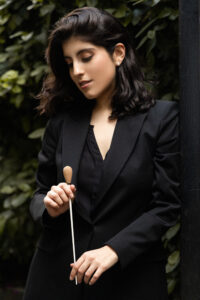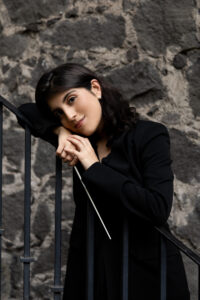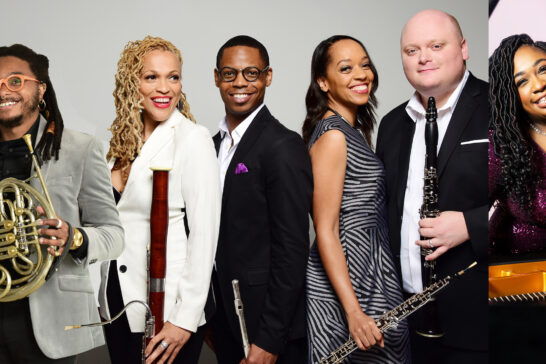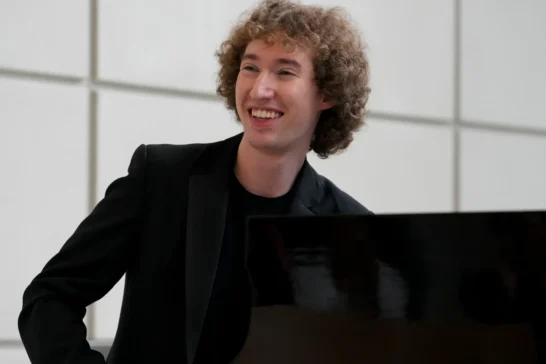Meet the Student: Q&A with Conductor Mariana Corichi Gómez

Mariana Corichi Gómez, from Mexico City, entered the Curtis Institute of Music in 2024 and studies with Yannick Nézet-Séguin, Curtis’ head of conducting, and James Ross (’89), director of orchestral studies, as the Rita E. Hauser Conducting Fellow. On Saturday, April 26, 2025, at 3 p.m., Ms. Gómez will conduct Lili Boulanger’s D’un Matin de printemps (“Of a Spring Morning”) in the final Curtis Symphony Orchestra concert of the 2024–25 series, “Yuja Wang Plays Rautavaara.”
 At Curtis, you’re uniquely positioned to explore, refine, and showcase your artistry. How has this fellowship influenced your growth, and what projects or performances have been particularly meaningful to you since you arrived at the school?
At Curtis, you’re uniquely positioned to explore, refine, and showcase your artistry. How has this fellowship influenced your growth, and what projects or performances have been particularly meaningful to you since you arrived at the school?
There are so many opportunities I’ve had in my first year as a fellow that have changed the way I think about music-making. I grow immensely every time Yannick coaches me in lab orchestra. His teaching empowers me to express my musical ideas in the most genuine way possible. My lessons and seminars with Dr. Ford Lallerstedt have not only transformed how I listen to and study orchestral repertoire, but also how I approach my artistry and humanity. My two favorite projects so far have been the two operas I worked on at the beginning of 2025. I conducted the one-act Rhiannon’s Condemnation, written by Leigha Amick (’24), and assisted our production of Le nozze di Figaro. It was so special to music direct Rhiannon with a dream team of collaborators who worked tirelessly during our one week of rehearsals. Assisting nozze (one of my favorite scores ever) reaffirmed my love and respect for opera, and I was truly thrilled to work with the outstanding singers at Curtis.
Watch Ms. Gómez conduct a performance of Curtis alumna Leigh Amick’s Rhiannon’s Condemnation, on January 22, 2025 in Gould Rehearsal Hall.
Your experience as a conductor spans styles and centuries, from early music to contemporary compositions. How do you approach embodying such varied musical styles before you even step on the podium, and do you find that your perspective as a bilingual, bicultural artist shapes your musicianship and decision to take on particular projects?
I began conducting choirs when I was 15 years old, and the first piece I ever conducted was a Venezuelan song (Alma Llanera). I have always adored performing repertoire from Latin America, whether it be folk music that I listened to growing up or new pieces by living composers. Latin American music always has and always will resonate deeply in my heart, and I feel the same all-consuming love when I listen to Bach, Tchaikovsky, and Debussy. I am truly happy when I’m studying a score at my desk or piano, asking myself all these questions about what each composer meant, imagining how certain articulations sound based on the style, singing individual lines to understand the beauty behind each phrase. At the core, I approach operas and symphonies the same way I approach a Mexican bolero: the tedious work allows me to, in the end, sing from my heart. As a Mexican conductor, I feel especially proud to perform repertoire in Spanish and from Mexican composers. Last season, I conducted a performance of Daniel Catán’s opera, Florencia en el Amazonas, and next season I will conduct Gabriela Ortiz’ groundbreaking Revolución Diamantina for full orchestra and eight singers.
As a conductor, what changes would you like to see in the industry, and how do you envision your role in shaping its future?
I want us to challenge traditional expectations of what it means to lead. In the conducting world, we have created more opportunities for women and people of color; however, there is still work to do to foster a more inclusive industry. I have noticed that some musicians resist the notion that diversity and musical excellence are compatible with one another. These behaviors and patterns are not exclusive to our classical music bubble–we are only a microcosm of what is going on in the rest of the world. I would love for us to have more transparent conversations within our musical communities about how we can change the greater culture through our daily actions and words. On and off the podium, I want to live by my values of leading through kindness, vulnerability, and empathy. There is always the pressure to contort myself to fit neatly into the traditional mold that dictates what a conductor “should” be. Thankfully, there are so many conductors I look up to who have rejected these confines, and I aspire to make music as my true self.
Watch Ms. Gómez conduct a reading-rehearsal of excerpts from the Act 2 finale of Curtis Opera Theatre’s Le nozze di Figaro, on February 13, 2025, in Field Concert Hall.
What advice would you offer young female conductors striving to forge their own paths?
I would urge young women to unapologetically show up as their true selves on the podium, never to make themselves smaller, and advocate for themselves and each other. I would urge younger women to keep trusting their instincts on what feels right, even when it may lead to unconventional paths. I often remind myself not to compromise my integrity and how I express myself in the clothes I wear, the feelings I emote, or the questions I ask. I really believe that honoring our authentic selves will make a difference in this field.
 Beyond the stage, artists often engage with their communities in meaningful ways. How do you see your role as a musician extending beyond performance, and are there any initiatives or causes that you are particularly passionate about?
Beyond the stage, artists often engage with their communities in meaningful ways. How do you see your role as a musician extending beyond performance, and are there any initiatives or causes that you are particularly passionate about?
I am passionate about accessible music education and believe in doing the decades-long work to create space in this industry for all humans. I have previously worked as a teaching artist with Trenton Arts at Princeton and Yale Music in Schools Initiative, conducting youth choirs. With the help of Mary Javian and Louis Russo, I’m currently leading the new choir at the Carver High School of Engineering and Science in North Philadelphia. Our students are so talented, curious, and supportive of one another. I love the community we’re building during our weekly rehearsals, and we’re currently working toward our first public performance in May!
Visit Mariana Corichi Gómez’s official website HERE.
Interview with Ms. Gómez by Ryan Scott Lathan.
Yuja Wang Plays Rautavaara
The Jack Wolgin Orchestral Concerts
Saturday, April 26, 2025 at 3:00 p.m.
Marian Anderson Hall at the Kimmel Center; Broad and Spruce Streets, Philadelphia
| Lili Boulanger | D’un matin de printemps | |
| Einojuhani Rautavaara | Piano Concerto No. 1 | |
| Maurice Ravel | Shéhérazade, Three Poems of Tristan Klingsor for Voice and Orchestra | |
| Claude Debussy | La mer, trois esquisses symphoniques pour orchestre |
Yannick Nézet-Séguin, conductor
Mariana Corichi Gómez, conducting fellow
Yuja Wang (’08), piano
Judy Zhuo, mezzo-soprano
Curtis Symphony Orchestra
Click HERE for more information.
Philanthropic Support for Curtis’ 2024–25 Season
Curtis’ Centennial Season is made possible through the support of Derek and Sissela Bok, the Mary Louise Curtis Bok Foundation, Deborah M. Fretz, Charles C. Freyer and Judith Durkin Freyer, Mignon and Jim Groch, Rita E. Hauser, Lisa and Gie Liem, Bob and Guna Mundheim, Judith and James Ritchings, Bob and Caro Rock, and Mark and Robin Rubenstein.
Guest conductor appearances for each Curtis Symphony Orchestra performance are made possible by the Rita E. and Gustave M. Hauser Chair in Conducting Studies.
Orchestral concerts are supported by the Jack Wolgin Curtis Orchestral Concerts Endowment Fund.
Curtis Institute of Music receives state arts funding support through a grant from the Pennsylvania Council on the Arts, a state agency funded by the Commonwealth of Pennsylvania
Photos of Mariana Corichi Gómez by Gonzalo Perea Photography.


